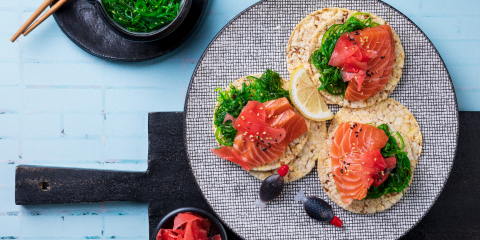Your Essential Guide to A Good Night’s Sleep

Are you one of the many people who find it difficult to get a good night’s sleep? If you answered yes, the effects of this are not only felt the next day in levels of alertness but may be influencing other aspects of your life and health in negative ways.
If you are consistently getting 6 hours or less of sleep this can cause havoc to your health and put you at greater risk of chronic diseases. On top of this, lack of sleep puts your hunger hormones out of balance and can cause you to make less optimal food choices throughout the day.
There is hope at hand. Your nutrition choices can help you to put a good night’s sleep back in your favor. Studies suggest that an overall balanced diet can promote a good night’s sleep. Including meals and snacks with adequate protein, fats and carbohydrates are the first step.
Firstly, looking deeper into carbohydrates, it is recommended to include carbohydrates which have a low glycemic index and meals with a low glycemic load. This means that these carbohydrates release sugar into your blood more slowly. Foods with more fiber will have a lower glycemic index and together in a meal create a lower glycemic load. Foods which have a lower glycemic index and are good choices to lower the glycemic load of a meal or snack can include nuts, seeds, wholegrains and wholegrain containing foods, legumes and beans, fruit, and vegetables.
When looking specifically at protein, including foods which are rich in an amino acid called tryptophan is recommended. Tryptophan is an amino acid which is a precursor to making melatonin. Melatonin has a sleep promoting effect.
Good sources of foods which have a high amount of tryptophan include:
- Milk
- Cheese
- Eggs
- Seafood
- Peanuts
- Soy and tofu
- Sesame seeds and pumpkin seeds
- Turkey
A sleep promoting fat to include in your diet is omega-3 fat. This essential, polyunsaturated fat may promote a good night’s sleep by having a positive effect on the secretion of serotonin. Seafood contains the main fat used by your brain called eicosapentenoic acid (EPA). This fat is essential for your brain to function optimally. It makes sense that this fat would support sleep. For many health reasons including sleep quality it is recommended to include one hundred grams of cooked seafood two to three times a week.
Before heading to the nearest fast-food outlet for dinner it is good to mention that foods which are higher in saturated fat and refined carbohydrates and low in fiber do not support a good sleep. This is one of the many reasons that the ‘sometimes foods’ are best kept as an occasional treat rather than a daily staple.
Take home message: There are many strategies you can use to help improve your sleep quality. Your diet is one which may be the missing link to getting the extra hours of sleep you have been searching for.
References:
- Sejbuk M, Mirończuk-Chodakowska I, Witkowska AM. Sleep Quality: A Narrative Review on Nutrition, Stimulants, and Physical Activity as Important Factors. Nutrients. 2022; 14(9):1912. https://doi.org/10.3390/nu14091912
- Tanaka, E.; Yatsuya, H.; Uemura, M.; Murata, C.; Otsuka, R.; Toyoshima, H.; Tamakoshi, K.; Sasaki, S.; Kawaguchi, L.; Aoyama, A. Associations of protein, fat, and carbohydrate intakes with insomnia symptoms among middle-aged Japanese workers. J. Epidemiol. 2013, 23, 132–138.
- Bravo, R.; Matito, S.; Cubero, J.; Paredes, S.D.; Franco, L.; Rivero, M.; Rodríguez, A.B.; Barriga, C. Tryptophan-enriched cereal intake improves nocturnal sleep, melatonin, serotonin, and total antioxidant capacity levels and mood in elderly humans. AGE 2012, 35, 1277–1285
- Lavialle M.; Champeil-Potokar, G.; Alessandri, J.M.; Balasse, L.; Guesnet, P.; Papillon, C.; Pévet, P.; Vancassel, S.; Vivien-Roels, B.; Denis, I. An (n-3) polyunsaturated fatty acid–deficient diet disturbs daily locomotor activity, melatonin rhythm, and striatal dopamine in syrian hamsters. J. Nutr. 2008, 138, 1719–1724.